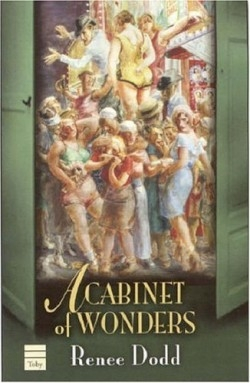
A Cabinet of Wonders
In our entertainment-surfeited era, with everything from cables to satellite signals flooding our homes with hundreds of television channels, thousands of movies, and millions upon millions of Internet sites, we rarely remember or appreciate how truly thrilling it once was when the circus—or its less sophisticated, seedier sibling the carnival—came to town. In rural areas where a sandlot baseball game could make headlines and a square dance qualified as a major social event, the arrival of acrobats and animal acts, carousels, cocoanut shies, and hootchie-kooch dancers was exciting indeed—and of all the attractions, the most exotic were surely the human oddities gathered into what was known as a freak show, a sideshow, or as in this new novel, A Cabinet of Wonders.
Dugan, the dwarf impresario who presides over the premier box-office draw of the Starlight Carnival Royale, is paterfamilias of a unique “family” that includes among others) a fur-covered Wolf Girl with a gambling habit; a spirited pair of Siamese twins teetering on the edge of womanhood; a troubled, runaway preacher’s son whose entire body is tattooed with Biblical images; and a hermaphrodite of pansexual appeal and extraordinary emotional sensitivity. Unfolding from spring to autumn of 1927 and wending its way from Alabama to West Virginia, the book chronicles the adventures—and increasing fragmentation—of Dugan’s troupe as it confronts changes that deftly combine the singular problems of “unnatural” individuals and the universal challenges faced by everyone everywhere.
Defying the carnie stereotype, which typically ranges from shady cynicism at best to the murderous despair of Tod Browning’s notorious 1932 film Freaks and Fellini’s La Strada, the author presents a gallery of amazingly self-aware and articulate protagonists set against a well-researched and vividly drawn backdrop. Part period piece and part fable, her book summons up Paper Moon‘s roguish charm, unsettling flashes of Flannery O’Connor, and a sort of Southern magical realism that grows more pronounced as the story progresses. For instance, after being deflowered in a sad, wham-bam seduction at once bizarre and predictable, the Siamese twins ultimately find happiness in Hollywood with a rich, devoted suitor).
Improbable as it may sound, however, this peculiar mix works more often than not, especially once the reader has begun to see Dugan’s Cabinet as normal and familiar and the rubes, marks, and “respectable” citizens as the outsiders. Suddenly, the conjoined Molly and Faye embody every teenager’s emotional stew of hope and apprehension with surprising effectiveness; by the same token, Alex/Alexandra the Man-Woman is both persuasive and poignant despite a lucrative but potentially very off-putting sideline in sexual favors after the show.
The author, a first-time novelist who teaches creative writing at Georgia College and State University, carries off her literary high-wire act far more successfully than might be expected. Her ear for dialogue is often excellent, as is her feel for 1920s idiom and the insider argot of the tight-knit carnival subculture—good enough so that her lapses jar, as in this conversation between the lovelorn Roxy and Saffron the Wolf-Girl about Alex the hermaphrodite: “Roxy said defensively, ‘Alex is perfect.’ Saffron shook her head. ‘No he’s not. She’s unique and smart, and full of life, and everyone who knows him comes to love him in one way or another, but she’s not perfect.’” The alternation of gender is the voice of modern political correctness, not the voice of a real person eighty years ago.
By the same token, Dodd’s descriptions sometimes take on a distinctly, distractingly purple hue. Of a black photographer, she writes, “as he traveled with various outfits, finally settling on the Starlight Carnival Royale, Finch believed that like his kindred spirits from the past journeying bravely into the American West, he, too, traveled through unknown frontiers, searching, working towards and growing ever nearer to a perfect revelation of human truth.” For a sharecropper’s son, even so gifted a one as Finch, this is an awfully heavy rhetorical bale to tote.
On the other hand, the suspension of disbelief is part of the price of admission to this tale; readers who test it too rigorously against reality may come away unconvinced, but those who take it on its own terms will find that its players put on a pretty good show, encompassing casual cruelty and convincing compassion, sorrow and satisfaction, the passing of one close family but the promise of other, newer ones to replace Dugan’s Cabinet of Wonders—a collection of “freaks” who, when all is said and done, look a lot more like ourselves than we might ever have guessed.
Reviewed by
Peyton Moss
Disclosure: This article is not an endorsement, but a review. The publisher of this book provided free copies of the book to have their book reviewed by a professional reviewer. No fee was paid by the publisher for this review. Foreword Reviews only recommends books that we love. Foreword Magazine, Inc. is disclosing this in accordance with the Federal Trade Commission’s 16 CFR, Part 255.
